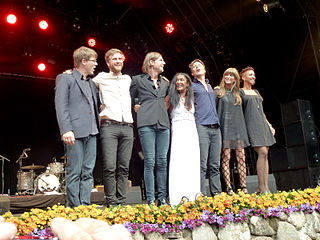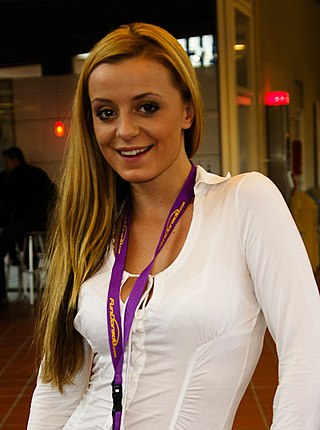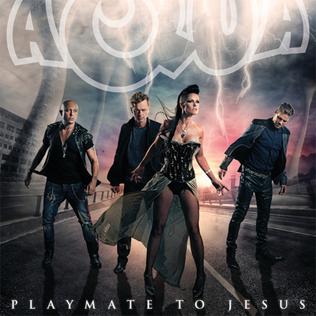
Maria Viktoria Mena is a Norwegian pop singer, best known for her singles such as "You're the Only One", "Just Hold Me", "All This Time" which charted in multiple countries.

Susanne Salomonsen is a Danish singer and songwriter, better known under the nickname Sanne Salomonsen. Salomonsen joined a local rock band in 1967, and her first solo album was released in 1973. She became one of the most famous singers in Denmark during the 1980s. Various songs sung or written by her have been on the local charts.
Cartoons, also known as Cartoons DK, are a Eurodance band from Denmark, best known for their song "DooDah!" and their cover of the 1958 novelty song "Witch Doctor", both hits released in 1998.

The Savage Rose is a Danish psychedelic rock group, formed in 1967.

"Chirpy Chirpy, Cheep Cheep" is a song recorded in 1970 by its composer Lally Stott, and made popular in 1971 by Scottish band Middle of the Road for whom it was a UK #1 chart hit. That version is one of fewer than fifty singles to have sold more than ten million physical copies worldwide.

Greatest Hits is the second greatest hits album by Danish-Norwegian pop band Aqua. The album was released on June 15, 2009, on Universal. Although it is their second greatest hits album, it is the first one to be released internationally, with Cartoon Heroes: The Best of Aqua (2002) only being released in Japan. The compilation was not released on any physical or digital format in North America. Greatest Hits includes digitally remastered versions of sixteen songs from Aqua's two previous studio albums, Aquarium (1997) and Aquarius (2000), and three new songs: "Back to the 80s", "My Mamma Said", and "Live Fast – Die Young". "Back to the 80s" was released as the album's lead single on May 25, 2009.

Big Fat Snake is a Danish pop/rock music group that was founded in 1990.
Daze is a Danish Eurodance band whose 1997 debut album Super Heroes became a double platinum international hit. The band is a trio composed of Lucas Sieber, Jesper Tønnov, and Trine Bix, and their style of "zany" "turbo-pop" music is compared to the Danish-Norwegian pop band Aqua. Super Heroes, initially published in Scandinavia by Sony Music, sold 31,000 copies on the release day and was later released in the United States by Columbia Records and in Non-Nordic global territories by Epic Records. Hit singles included "Superhero", "Tamagotchi" and "Toy Boy". In February 1998, Daze won the Danish Grammy Award for Best Dance Album of 1997. The single Superhero was nominated as 1997 Danish hit of the year by G.A.F.F.A. magazine. It was also very famous in Argentina during those years.

Denice Klarskov is a Danish pornographic actress and entrepreneur.

Megalomania is the third studio album by Danish band Aqua. It was released on October 3, 2011, by Universal Music Group and WaterWorks, over 11 years after the release of their second studio album, Aquarius (2000). The album peaked at number two in Denmark and was certified gold by the International Federation of the Phonographic Industry (IFPI).

Before the Dinosaurs is the second studio album by Danish singer-songwriter Aura Dione. The album was released on 4 November 2011 by Universal Music. It was preceded by the lead single, "Geronimo" on 19 September 2011. Upon its release, the album received mixed reviews from most music critics, who compared the singer to Lady Gaga but felt the album was over-produced.

"Playmate to Jesus" is a song by Danish-Norwegian pop band Aqua from their third studio album, Megalomania. The song, which was released in 2011, is about universal love and "what goes around comes around". The song was published the same day as their promotional single, "Like a Robot", which was originally planned to be released in July 2011. Despite the song's positive critical reaction, it only charted in Denmark, becoming the group's second lowest-charting single. The music video, directed by Michael Sauer Christensen and filmed in Lyngby, Denmark, premiered on 22 September 2011.

For altid (Forever) is the fourth studio album released by Danish-Chilean electropop singer Medina. It was released in Denmark on 19 September 2011 through Labelmade, A:larm and Universal Music, peaking at number 2 on the Danish Albums Chart. Three singles of this album have peaked at number 1 on the Danish Singles Chart, and the other singles were all in the top ten.

Nikolaj Koppel is a Danish musician, journalist and radio presenter.
Fu:el was a Danish boy band consisting of the members Lars Thomsen, Theis Keller, Patrick Hellegård, Tarik Bakir and Martin Bunk. They became known as participants of the third season of the reality show Popstars in the spring of 2003, where the goal was to form a new Danish boyband.

Nicole Stokholm Pedersen, known professionally as Sada Vidoo, is a Danish singer and songwriter. She is best known for taking part in series thirteen of The X Factor UK and Dansk Melodi Grand Prix 2017.
Jim Lyngvild is a Danish designer, writer, photographer, fashion columnist and television personality.
This is the discography of pop group Les Humphries Singers.













